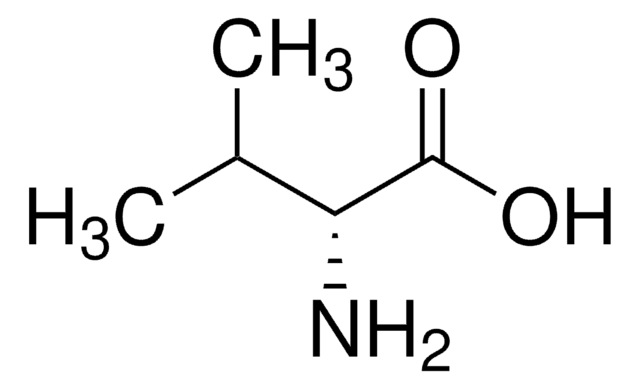94619
L-Valine
≥99.5% (NT), BioUltra
Synonym(s):
(S)-α-Aminoisovaleric acid, L-2-Amino-3-methylbutanoic acid
About This Item
Recommended Products
product name
L-Valine, BioUltra, ≥99.5% (NT)
product line
BioUltra
Quality Level
Assay
≥99.5% (NT)
form
powder or crystals
optical activity
[α]20/D +27.0±0.5°, c = 5% in 5 M HCl
impurities
insoluble matter, passes filter test
≤0.3% foreign amino acids
ign. residue
≤0.05%
loss
≤0.05% loss on drying, 20 °C (HV)
color
white
mp
295-300 °C (subl.) (lit.)
solubility
1 M HCl: 0.5 M at 20 °C, clear, colorless
anion traces
chloride (Cl-): ≤50 mg/kg
sulfate (SO42-): ≤50 mg/kg
cation traces
Al: ≤5 mg/kg
As: ≤0.1 mg/kg
Ba: ≤5 mg/kg
Bi: ≤5 mg/kg
Ca: ≤50 mg/kg
Cd: ≤5 mg/kg
Co: ≤5 mg/kg
Cr: ≤5 mg/kg
Cu: ≤5 mg/kg
Fe: ≤5 mg/kg
K: ≤50 mg/kg
Li: ≤5 mg/kg
Mg: ≤5 mg/kg
Mn: ≤5 mg/kg
Mo: ≤5 mg/kg
NH4+: ≤150 mg/kg
Na: ≤100 mg/kg
Ni: ≤5 mg/kg
Pb: ≤5 mg/kg
Sr: ≤5 mg/kg
Zn: ≤5 mg/kg
λ
0.5 M in 1 M HCl
UV absorption
λ: 260 nm Amax: 0.15
λ: 280 nm Amax: 0.1
SMILES string
CC(C)[C@H](N)C(O)=O
InChI
1S/C5H11NO2/c1-3(2)4(6)5(7)8/h3-4H,6H2,1-2H3,(H,7,8)/t4-/m0/s1
InChI key
KZSNJWFQEVHDMF-BYPYZUCNSA-N
Looking for similar products? Visit Product Comparison Guide
Application
- Metabolomics reveals metabolites associated with hair follicle cycle in cashmere goats.: This study utilizes L-Valine as a standard for detecting, understanding, and enhancing hair follicle cycles in cashmere goats through metabolomic analysis, aiding in the improvement of fiber production and quality (Ma et al., 2024).
Other Notes
Storage Class Code
11 - Combustible Solids
WGK
WGK 1
Flash Point(F)
Not applicable
Flash Point(C)
Not applicable
Personal Protective Equipment
Certificates of Analysis (COA)
Search for Certificates of Analysis (COA) by entering the products Lot/Batch Number. Lot and Batch Numbers can be found on a product’s label following the words ‘Lot’ or ‘Batch’.
Already Own This Product?
Find documentation for the products that you have recently purchased in the Document Library.
Customers Also Viewed
Articles
Inborn errors of metabolism are caused by changes in specific enzymatic reactions and hundreds of different such alterations, which affect about 1 of every 5000 newborns, have been characterized.
Our team of scientists has experience in all areas of research including Life Science, Material Science, Chemical Synthesis, Chromatography, Analytical and many others.
Contact Technical Service





